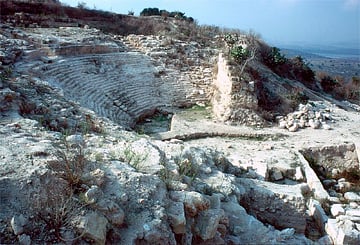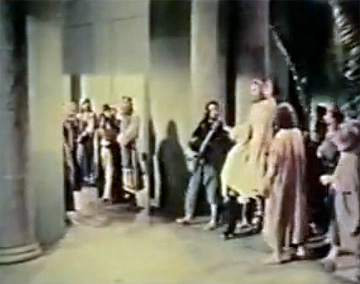The Perspective of Jewish Leaders in Jerusalem
Although the majority of Jews in Jerusalem may not have wanted Jesus to die, or may have had no opinion either way, some of the most influential Jews did see Jesus’ death as necessary. All four New Testament Gospels testify to the key role of the “chief priests” and other Jewish leaders in the effort to have Jesus crucified. The chief priests included the high priest Caiaphas, who was appointed by Pilate, and other priests who provided leadership, not only for the temple, but also for all religious and civic affairs in Jerusalem. Some other learned and powerful Jewish leaders joined with the chief priests in the effort to silence Jesus once and for all.
Although not providing specific names or titles, the first-century Jewish historian Josephus concurs with what we find in the New Testament. In his Jewish Antiquities, Josephus devotes a short section to the antics of Pontius Pilate. In this context the historian writes that Pilate, “at the suggestion of the principal men amongst us,” had Jesus “condemned to the cross” (Antiquities 18.3.3). Unfortunately Josephus does not explain why these “principal men,” presumably the chief priests and other leaders, had it in for Jesus.
Why did leading Jews in Jerusalem believe it was necessary for Jesus to die? Part of the answer to this question comes from the Gospel of John, in a scene where a group of Jewish leaders was debating the problem of Jesus’ problematic popularity. “If we let him go on like this,” they said, “everyone will believe in him, and the Romans will come and destroy both our holy place and our nation” (John 11:48). Jesus was stirring up the people with his message of God’s kingdom and with his mighty deeds, and he wasn’t the first to walk down this perilous road. Others had done so before him and the result hadn’t been good for the Jews. Inevitably the Romans swept into Judea with their armies, slaughtering some, crucifying others, and taking still others into slavery. They had no hesitation about destroying an entire city if only some its residents had challenged Roman authority. So it would be logical for Jewish leaders to fear that Jesus might indeed bring down Roman wrath upon both the temple and the nation. (Photo: The ruins of a theatre in Sepphoris in Galilee. Shortly after Jesus was born, a man named Judas led a makeshift militia in a successful assault against the royal palace. Of course Rome didn’t wink at Judas and his gang. Ultimately the Roman army recaptured Sepphoris, taking all of its residents as slaves and burning the city to the ground. (See my book Jesus Revealed, p. 104)

In the midst of this debate about the problem of Jesus, John records the counsel of the high priest, Caiaphas: “You know nothing at all! You do not understand that it is better for you to have one man die for the people than to have the whole nation destroyed” (John 11:50). Since Caiaphas did not believe that Jesus fit the job description of God’s messiah, and since he shared with his colleagues the fear of Roman reprisals against the Jews, his argument made sense. Better that Jesus should die than the whole nation be destroyed.
When Caiaphas and his cohort finally captured Jesus and brought him to Pilate so that he might be crucified, their accusations touched upon several ways he was endangering the Jewish people. “We found this man perverting our nation,” they said, “forbidding us to pay taxes to the emperor, and saying that he himself is the Messiah, a king” (Luke 23:2). When Pilate was underwhelmed, they added, “He stirs up the people by teaching throughout all Judea, from Galilee where he began even to this place” (Luke 23:5). In other words, Jesus was both undermining orderly Roman rule (forbidding taxes, claiming to be king, stirring up the people) and seducing the Jewish people to abandon their religious commitments (keeping the Sabbath, offering sacrifices in the temple, separating themselves from “sinners”).
Although we Christians may want to argue that these accusations were false, it’s easy to see how, from the perspective of the Jewish leaders, they appeared to be true, dangerously true. Moreover, we find in Jewish sources basic confirmation of what Luke puts upon the lips of the leaders. In the Babylonian Talmud (a fifth-century collection of earlier Jewish oral traditions), we read the following:
There is a tradition: They hanged Yeshu on the Sabbath of the Passover. But for forty days before that a herald went in front of him (crying), “Yeshu is to be stoned because he practiced sorcery and seduced Israel and led them astray from God”. (b. Sanhedrin 43a)
Although the details don’t fit perfectly with the New Testament accounts, the charges against Jesus confirm what we have already seen. Jesus was said to “practice sorcery,” which is how his miracles would have appeared to his opponents, and which explains his ability to arouse the people. He also “seduced Israel and led them astray from God.” How similar this is to the charges in Luke 23, where Jesus was said to have perverted the nation and stirred up the people.
The concerns of Jewish leaders and their desire to get rid of him would probably not have come to fruition except for something Jesus did to provoke their concerted effort to have him crucified. I’ll examine this action in my next post.

